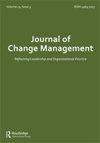Servus or Pater? How Paradoxical Intent Can Qualify Leadership: Inductions from the Kingdom of Bhutan
IF 3
Q2 MANAGEMENT
引用次数: 0
Abstract
ABSTRACT We offer a set of conceptual distinctions between servant and paternalistic leadership, which we support with a new model that further extends the notion of paradoxical dynamic equilibrium. We used an in-depth case study of narratives on servant and paternalistic leadership from the Kingdom of Bhutan’s transition to democratic leadership. These narratives are rich in paradoxical tensions from which we extrapolate our findings. From our inductive documentary analysis, we establish that servant and benevolent paternalistic leadership perform genuine concern for the wellbeing of followers. However, while servant leaders seemingly promote centrifugal forces of change, humility and broader inclusion of others as followers, paternalistic leaders (both benevolent and exploitative), focus on the centripetal forces of stability, unquestioned authority and exclusion of those that do not follow and thus are outside their direct protection. As outlined in our circular model of paradoxical intent, distinguishing servant leadership and paternalistic leadership can be understood through distinct splitting and integration processes between the poles of main and utilitarian intent. MAD statement The concept of servant leadership seems to be increasingly adopted by organizations. This is a welcoming development given its potential contribution to address today's social and environmental challenges, as expressed in the UN Sustainable Development Goals. However, there is a risk that leaders carelessly appropriate the term without sufficiently understanding its unique characteristics and implications. Servant leadership can, for instance, be easily confused with paternalistic leadership. This article aims to clarify the distinctions between these two models and contribute to a more conscious adoption and development of servant leadership in organizations.Servus还是Pater?矛盾的意图如何成为领导的资格:来自不丹王国的介绍
我们提供了一套仆人式领导和家长式领导之间的概念区别,我们用一个新的模型来支持,该模型进一步扩展了矛盾动态均衡的概念。我们对不丹王国向民主领导过渡的仆人式和家长式领导的叙事进行了深入的案例研究。这些叙述充满了矛盾的张力,我们从中推断出我们的发现。从我们的归纳文献分析中,我们建立了仆人式和仁慈的家长式领导对追随者的福祉表现出真正的关注。然而,虽然仆人式领导似乎促进了变革的离心力、谦卑和更广泛地包容他人作为追随者,但家长式领导(既有仁慈的,也有剥削的)关注的是稳定的向心力、无可置疑的权威和排斥那些不跟随的人,因此不在他们的直接保护范围内。正如我们在矛盾意图的循环模型中所概述的那样,区分仆人式领导和家长式领导可以通过主要意图和功利意图两极之间不同的分裂和整合过程来理解。服务型领导的概念似乎被越来越多的组织所采用。正如联合国可持续发展目标所表达的那样,这是一个值得欢迎的发展,因为它可能为应对当今的社会和环境挑战做出贡献。然而,领导者在没有充分了解其独特特征和含义的情况下随意使用这个术语是有风险的。例如,仆人式领导很容易与家长式领导相混淆。本文旨在澄清这两种模型之间的区别,并有助于在组织中更有意识地采用和发展服务型领导。
本文章由计算机程序翻译,如有差异,请以英文原文为准。
求助全文
约1分钟内获得全文
求助全文
来源期刊

JOURNAL OF CHANGE MANAGEMENT
MANAGEMENT-
CiteScore
6.60
自引率
20.00%
发文量
14
期刊介绍:
Journal of Change Management is a multidisciplinary and international forum for critical, mainstream and alternative contributions - focusing as much on psychology, ethics, culture and behaviour as on structure and process. JCM is a platform for open and challenging dialogue and a thorough critique of established as well as alternative practices. JCM is aiming to provide all authors with a first decision within six weeks of submission.
 求助内容:
求助内容: 应助结果提醒方式:
应助结果提醒方式:


